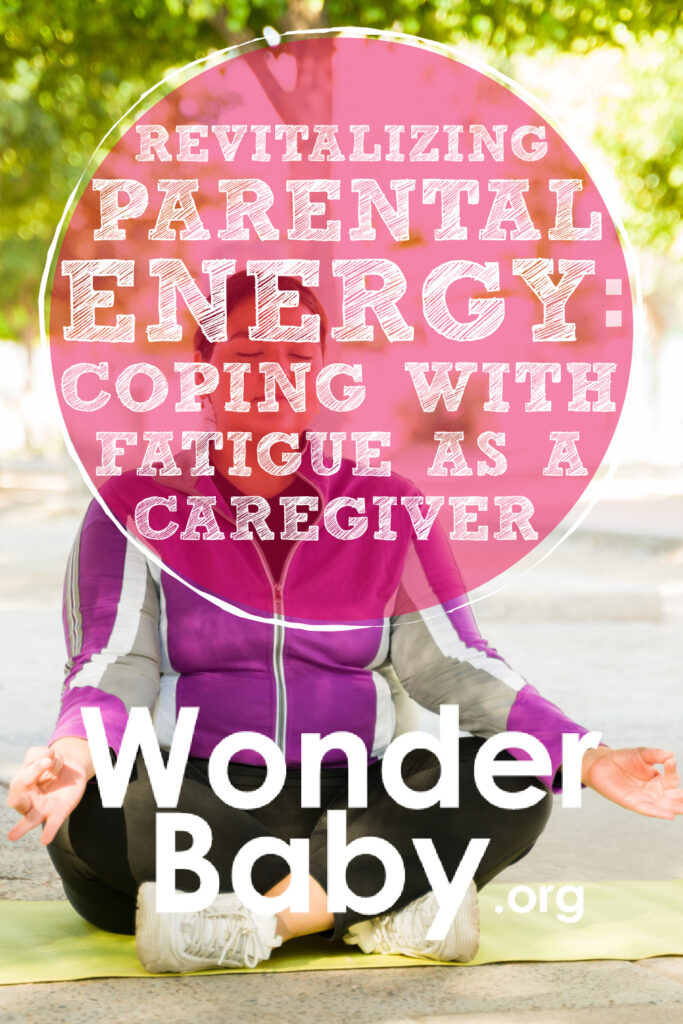Revitalizing Parental Energy: Coping with Fatigue as a Caregiver

- Caregiver burnout is generally caused by the emotional demands of caring for a family member requiring medical attention.
- Signs of caregiver burnout include compassion fatigue, changes in appetite, personal neglect, and withdrawal.
- Understanding the impact of parental fatigue is essential for the caregiver’s and the child’s well-being.
Taking care of someone you love can take a toll on your mental health. While there’s nothing we wouldn’t do for our family members, it can lead to caregiver stress, and you frequently forget about your health.
The constant emotional, physical, and mental demands on family caregivers have significant long-term impacts, so it’s essential to address them before you feel like they are out of your control.
You can address caregiver fatigue with local resources, caregiver support services, and a mental health professional. Remember, if you can’t take care of yourself, you won’t be able to care for someone else. Wanting to take time for yourself doesn’t make you a bad caregiver.
Strategies for Managing Fatigue
Managing fatigue involves a combination of lifestyle adjustments, self-awareness, and proactive strategies. One of the best things you can do to avoid fatigue and burnout is to plan. Many caregivers find success in self-care if they mark their calendars when it’s time for personal care.
Prioritize Self-Care

You are not a bad person if you want time to yourself each day for self-care. Let me say it louder for the people in the back. Just because you are overwhelmed and need to escape doesn’t mean you aren’t a fantastic parent.
Even if you give yourself just an hour a day, you’ll help relieve the physical exhaustion you experience daily. It’s essential to recognize that taking care of yourself is vital in providing quality care for your child.
Here are a few tips on how to prioritize self-care:
- Stay hydrated and aim for a balanced diet.
- Have regular health check-ups with your doctor.
- Move your body daily with regular exercise.
- Establish boundaries and learn how to say “no.”
- Take short breaks throughout the day.
Effective Time Management

A great idea to help manage time is to get a planner where you write down your appointments. I know I’d be lost without mine. You can also use it to create a structured daily routine to relieve stress for both you and your child.
Here are some tips for effective time management to reduce caregiver stress:
- Delegate tasks and seek support.
- Create a structured daily routine.
- Utilized respite care services (temporary care).
- Prioritize your tasks.
- Accept help.
- Know your limitations.
Finding a home health aide is an excellent way to use respite care when handling caregiver burnout. While family caregivers are vital, finding someone outside the home to help will allow you the time to take a mental health break.
Mental and Emotional Well-being

Don’t hesitate to find a support group for your own health and well-being. Family caregivers put themselves through a lot, mentally and emotionally, and caring for yourself is crucial.
Just because we’d do anything for our family doesn’t mean you should neglect yourself. For example, you can take time to practice mindfulness and learn stress-reduction techniques.
The Centers for Disease Control and Prevention11. Reduce Stress in 10 Minutes and Improve Your Well-Being. Centers for Disease Control and Prevention. 2022. https://www.cdc.gov/emotional-wellbeing/features/reduce-stress.htm (CDC) recommend the following techniques to help reduce stress:
- Close your eyes and take deep breaths.
- Write three things you are grateful for.
- Find an inspiring song or quote and write it down.
- Be active, even for a few minutes.
- Check-in with yourself.
- Laugh!
The CDC suggests that a ten-minute break daily can help improve your mental health. I, admittedly, have a difficult time allowing myself to breathe. However, I sometimes lie in bed, close my eyes, and tune out my surroundings. While it’s a momentary break, it usually gives a reset to continue with the day.
If you still don’t feel relief, it may be time to talk with a professional and seek counseling. You can start this process by speaking with your primary care physician and requesting a referral if needed.
Understanding Caregiver Fatigue
Understanding the signs of caregiver fatigue is vital so you can address them before it becomes too overwhelming. While your loved one’s health concerns are important, so is acknowledging when you need a break.

Recognizing the Signs
Caregiver fatigue is a common challenge for individuals providing care to others, often family members looking after a loved one.
You may experience both physical and emotional symptoms of caregiver fatigue or burnout, leading to the following symptoms:
- Exhaustion
- Frequent illness
- Irritability
- Feeling overwhelmed
- Physical symptoms (e.g., exhaustion, frequent illness)
- Compassion fatigue
- Financial concerns
- Neglecting personal care
- Mood changes
- Difficulty concentrating
- Increased use of substances
As opposed to caregiver burnout, compassion fatigue may come on suddenly, and comes from your desire to help relieve the suffering of your loved one. Taking breaks, delegating tasks, and prioritizing self-care are essential for addressing and preventing caregiver burnout.
Contributing Factors
In addition to constant caregiving demands, there are contributing factors to caregiver burnout. Caregiving responsibilities can take a toll on a person, so it’s wise to understand why you are feeling a certain way.
Here are a few reasons why you may be experiencing caregiver burnout:
- Constant caregiving demands
- Lack of personal time and self-care
- Emotional stress and anxiety
- Unrealistic expectations
By recognizing the signs, addressing the causes, and implementing effective strategies, you can promote your health and provide better care to those you support.
Building a Support System
Knowing you aren’t the only one who experiences caregiver burnout and connecting with others can help you build a support system. Your friends and family are hopefully standing on the frontlines waiting to help, but sometimes, it’s best to reach out to the community.

Leverage Community Resources
It’s a great idea to reach out to local support groups for special needs parents and take advantage of their benefits. How good you feel when talking to others in a similar situation is amazing.
You can find local caregiver support groups or hire private care aides to help with medical care. In addition, national organizations like the Caregiver Action Network22. Home. Caregiver Action Network. https://www.caregiveraction.org or the Family Caregiver Alliance can provide support, information, and someone to talk to.
The Well Spouse Association33. WELL SPOUSE ASSOCIATION. NRD National Resource Directory. https://nrd.gov/resource/detail/12473624/Well+Spouse+Association is also an excellent group for spousal caregivers, providing information about the particular challenges and unique issues spouses experience when caring for a loved one.
Finding a local area agency will connect you with people in your area that you can meet up with and swap caregiving resources with.
Strengthen Family Bonds

Don’t hesitate to involve siblings and other family members in caregiving, and encourage open communication within the family. To prevent caregiver burnout, create a calendar for medical appointments, allowing family members to take turns supervising your loved one’s health conditions.
Remember, teamwork makes the dream work (and also helps relieve caregiver burnout)! If sharing responsibility is out of reach for your family, consider home health services, which can provide home health aides.
Unfortunately, family stress can lead to significant life events including divorce, so it’s important to address issues within your family immediately.
Energy-Boosting Activities for Mental Health

Even when I’m not up for it, I know regular physical exercise is excellent for my mental health. You can also pursue hobbies and favorite interests to keep your energy up. Allowing yourself a few hours a week to boost your mental health and reduce compassion fatigue can have long-lasting results.
You may also want to pursue family leave benefits at work and check whether you can get time off. Many caregivers can feel a boost in self-esteem if they can take a step away from work and focus on their mental health.
Restful Sleep Strategies to Relieve Caregiver Stress

According to the Mayo Clinic44. Sleep tips: 6 steps to better sleep. Mayo Clinic. 2022. https://www.mayoclinic.org/healthy-lifestyle/adult-health/in-depth/sleep/art-20048379, adults should sleep at least seven hours a night. Are you counting on one hand how much sleep you get?
It’s easy to take advantage of the alone time by staying up late. Sleep is beautiful, but there’s a good chance you have irregular sleep patterns and aren’t getting quality sleep if you have caregiver burnout.
If you’re suffering from mental exhaustion and caregiver burnout, take a step back and examine how much sleep you’re getting.
Tips for restful sleep include:
- Create a calming bedtime routine.
- Try back exercises.
- Ensure a comfortable sleep environment.
- Put your phone down and avoid exposure to light at bedtime.
- Keep your room dark, cool, and quiet.
- Avoid heavy meals before bed and stick to a healthy diet.
Long-Term Coping Mechanisms
Coping with caregiver burnout requires long-term strategies focusing on sustained well-being and resilience. While short-term coping mechanisms provide immediate relief, long-term strategies aim to build a foundation for ongoing stress management and self-care.

Set Realistic Goals
You likely won’t get several hours to yourself daily, so remember to set realistic goals to stay healthy and happy. Remember, you’ll want to adapt your expectations to avoid burnout or extreme stress.
If you know your child naps for two hours in the afternoon, take that time yourself. Don’t worry about the laundry, the dishes, or the dirty floor. Just take care of yourself. Severe stress can have a significant impact on your health, so it’s vital you address concerns because they make you chronically ill.
Continuous Learning and Adaptation
As with anything, it’s essential to keep yourself educated and embrace flexibility and change. For example, if your loved one has a progressive disease like Alzheimer’s Disease, you’ll want to keep yourself educated on advances in medicine and treatments
Remember, there are nursing services, nursing homes, assisted living facilities, and adult day care centers to help as your family members age.
Getting help from an outside source doesn’t mean you aren’t caring for your loved one. It means you recognize their needs are outside of your capability.
Develop Healthy Boundaries
Establishing and maintaining clear boundaries between your personal life and your caregiving role is important. In addition, it’s best to communicate your needs and limitations to others, aiding in a healthier balance.
Remember, healthy boundaries contribute to a supportive and positive family environment. It’s an ongoing process that requires communication, understanding, and adaptability.
FAQs
What are the symptoms of caregiver burnout?
If you’ve been caring for a loved one for quite some time, you might notice you don’t feel like yourself anymore. The Cleveland Clinic55. Caregiver Burnout. Cleveland Clinic. 2023. https://my.clevelandclinic.org/health/diseases/9225-caregiver-burnout has a great comparison, “Burnout feels like a candle that ran out of wick—it doesn’t have what it needs to continue to provide light.”
The following are common symptoms of caregiver burnout:
- Losing weight without trying
- Not getting enough sleep
- Having negative feelings
- Withdrawing from family and friends
- Feeling hopeless
Always discuss your mental and physical health with your doctor, as they can provide valuable advice on addressing caregiver burnout.
How can I find and connect with support groups for parents of children with special needs?
Finding a support group for parents who can relate to caregiver burnout is a fantastic idea. You can search online for a local organization near you, but here are national organizations that may help guide you in the right direction:
- Autism Society
- Parents Helping Parents
- The Arc of the United States
- National Association of the Deaf
How can technology aid in easing the burden of caregiving?
Technology is a double-edged sword; however, it might help most caregivers recharge and ease some of the burden.
For example, you can manage healthcare from a distance without visiting the doctor’s office to obtain medical records. You can also use technology to participate in online support groups or research relevant health information.
References
- Reduce Stress in 10 Minutes and Improve Your Well-Being. Centers for Disease Control and Prevention. (2022, October 6). https://www.cdc.gov/emotional-wellbeing/features/reduce-stress.htm
- Home. Caregiver Action Network. (n.d.). https://www.caregiveraction.org
- WELL SPOUSE ASSOCIATION. NRD National Resource Directory. (n.d.). https://nrd.gov/resource/detail/12473624/Well+Spouse+Association
- Sleep tips: 6 steps to better sleep. Mayo Clinic. (2022, May 7). https://www.mayoclinic.org/healthy-lifestyle/adult-health/in-depth/sleep/art-20048379
- Caregiver Burnout. Cleveland Clinic. (2023, August 16). https://my.clevelandclinic.org/health/diseases/9225-caregiver-burnout

Related Posts

Eye Conditions and Syndromes, Visual Impairment
Neuralink Announces Plans to Restore Sight to the Blind with Brain Chip
Elon Musk’s company Neuralink has announced plans to begin human trials of its new “Blindsight” brain chip by the end of 2025.

Special Needs
5 Spring Cleaning Tips for Families of Children with Disabilities
Spring cleaning is an opportunity to create a more accessible, organized, and supportive space for your child with disabilities. Declutter, deep clean, and refresh!

Visual Impairment
The Gift of Understanding: How a Young Child Helps His Blind Father Navigate Life
When a parent is blind, it’s natural for people to wonder how their sighted child will adapt. Will they struggle to understand their parent’s needs? Will they feel burdened by...